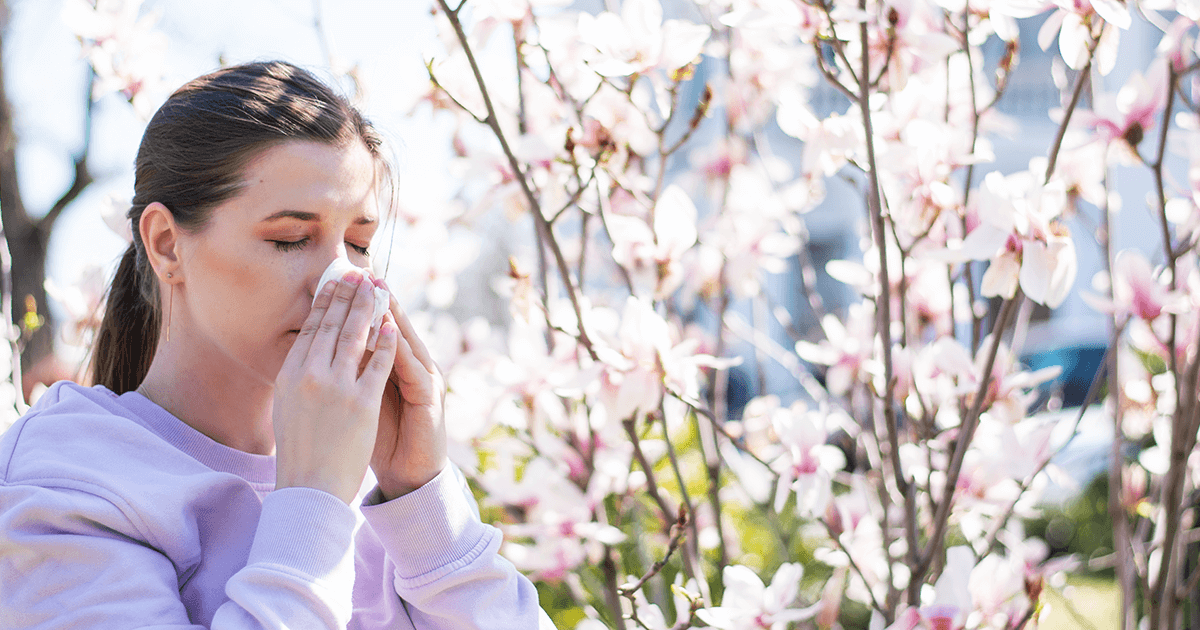
The arrival of spring is usually a time for enjoying the outdoors after a long cold winter. But if you have seasonal allergies, spring may deliver more than nice weather. For many people, spring is the time their allergies act up, and if that’s your situation, you’re not alone. Allergies are among the most prevalent chronic conditions people suffer from in the United States. In fact, a wide range of seasonal allergies can occur at any time of the year. According to the Asthma and Allergy Foundation of America (AAFA), more than 100 million people in the U.S. suffer from allergies every year and allergies are the sixth most common chronic illness in the country.
An allergic reaction happens when your immune system identifies a normally harmless substance, like dust, pet dander, certain foods, or pollen, as a threat and attacks it. This means your body is producing antibodies – substances that can adversely affect your skin, sinuses, digestive tract or airways. Your reaction can vary, depending on the severity of your allergy, resulting in a range of conditions from minor irritation to anaphylaxis – a possible life-threatening situation.
7 Tips to Fight Seasonal Allergies
- Check weather conditions in your area
- Avoid unnecessary exposure to allergy triggers outside
- Wear protective clothing
- Make sure the air indoors is clean
- Use OTC remedies to control seasonal allergy symptoms
- Try rinsing your sinuses
- See your doctor, if symptoms get worse
What Are Seasonal Allergies?
As the name implies, seasonal allergies are those associated with substances in the atmosphere that occur seasonally. These can include pollen, grasses, trees, weeds, dust, fungus spores and mold. You can have seasonal allergies during one particular time of year, or you can experience allergies during two or more seasons. While grasses, weeds and pollen occur seasonally, other allergens such as dust and mold can occur year-round, indoors. Also, the climate you live in can have an effect on seasonal allergies. Fungus and mold are exacerbated by rainy weather, while dust and pollen are more abundant in dry climates. The following is a list of common allergies for each of the four seasons.
🌼 Spring Allergies
If you live in a milder climate, Spring allergy season can begin as soon as late February and extend into early summer. The most common allergic reactions in spring are from grass and tree pollens. Typical tree pollen offenders include pine, willow and mulberry. Spring allergies from grass pollens include rye, oat and bermuda grasses.
☀️ Summer Allergies
Summer allergies begin in June and extend to September with peak activity in June and July. These allergies can produce eye irritation, coughing and sneezing. Common summer allergens include tree and grass pollens, mold, ragweed, mugwort and nettle. In addition, some pollens can be cross-allergens with food pollens. For instance, if you are allergic to grass pollens, you may also react to celery, melons, oranges, peaches and tomatoes. If ragweed pollen bothers you, so may cucumbers, melons, zucchini, bananas and sunflower seeds.
🍂 Fall Allergies
Fall allergies can extend your spring allergies from September to November with ragweed pollen being the most common offender. In fact, 75% of people with allergies to spring plants are also allergic to ragweed pollen. Furthermore, even if ragweed isn’t common in your area, its pollen can be carried thousands of miles in the wind. Mold is another common allergen in the fall – occurring not only indoors but outside in damp places such as in piles of wet leaves. Dust is another fall allergy that can occur when you turn on your furnace and dust mites are released in your home.
❄️ Winter Allergies
Although you may feel that winter offers relief from pollen allergies, in mild climates, weed pollens can extend into winter. Also, pet dander, dust mites and mold are common allergens in winter. Because winter is peak cold and flu season and the symptoms such as coughing and sneezing are the same, make sure you don’t have the flu or a cold before you treat your allergy symptoms.
Tips for Dealing With Seasonal Allergies
The symptoms caused by seasonal allergies can be frustrating and interfere with your daily activities. Symptoms can include congestion and runny or itchy nose, coughing, watery itchy eyes, sneezing, postnasal drip, discoloration or bags under your eyes and fatigue due to sleep loss. Here are some tips for avoiding unnecessary exposure to seasonal allergies as well as a chart for over-the-counter (OTC) remedies that can treat symptoms. HonestMed offers a wide array of health and wellness products that help alleviate seasonal allergy symptoms. The following are essential tips for dealing with seasonal allergies:
1. ✅ Check Weather Conditions in Your Area
One way to avoid high exposure to seasonal allergies is to check your local weather report for pollen levels. Start taking your allergy medication early if pollen counts are high, so you will be protected when you go outside. Close your doors and windows at night and avoid doing outdoor tasks in the morning when pollen counts tend to be the highest.
2. ✅ Avoid Unnecessary Exposure to Allergy Triggers Outside
If the weather is dry and windy, try to stay indoors. Should you need to mow the grass or do gardening chores, wear a mask. If your work involves being outdoors, wash your clothes and shower when you are back inside to get rid of pollen on your skin and hair. Don’t hang your clothes to dry outside where they can attract pollen
3. ✅ Wear Protective Clothing
If you must go outside during high pollen days, wear long-sleeved shirts and pants that protect you. You should also consider wearing a mask that is able to filter out pollen and dust particles. It may help to diminish the effects of seasonal allergies if you wash your clothes after you’ve been outside. According to studies, even if you try to shake all the pollen off your clothing before you go back inside, half of it is still there. It’s also a good idea to wear a hat outside and also to wash your face and hair before bedtime. This will ensure no pollen gets on your pillow near your face.
4. ✅ Make Sure the Air Indoors is Clean
Although there is no way to completely eliminate all allergens from your home environment, there are ways you can have more pollen-free air in your house. Be sure to keep windows and doors closed and use air conditioning in your home and car. Change air conditioning and heating filters often and be sure to keep up with regular maintenance of your air and heating systems. Using a dehumidifier indoors will help keep the air dry and avoid mold buildup. Use a vacuum cleaner with a high-efficiency HEPA filter and put a portable HEPA filter in your bedroom.
5. ✅ Use OTC Remedies to Control Seasonal Allergy Symptoms
Use OTC products to control the symptoms of seasonal allergies and if you experience the same symptoms each season, you should start taking medication before pollen, grass and mold levels reach their peak. HonestMed.com offers a wide range of remedies depending on the symptoms you are experiencing. The following chart includes symptoms of seasonal allergies and OTC remedies that can help mitigate them plus links to economically-priced products:
| Symptom | OTC Remedy |
| Itchy watery eyes | Antihistamine eye drops |
| Eye dryness and redness | Lubricant eye drops |
| Stuffy nose | Saline nasal spray, Corticosteroid nasal spray |
| Post-nasal drip, runny nose, watery eyes | Oral antihistamines such as Benadryl, and Zyrtec |
| Sinus congestion and headache | Oral decongestants such as Sudafed |
| Itchy rash | Anti-itch skin creams and lotions |
6. ✅ Try Rinsing Your Sinuses
Another approach to clearing sinuses congested by seasonal allergies is to use nasal irrigation. By using a gentle system that delivers a saline solution through your sinuses, you can rinse away mucus, allergens, dust, germs and even the residue left behind by nasal sprays. HonestMed offers the SinuPulse Elite, an advanced system that is safe and easy-to-use. SunuPulse Elite offers adjustable, calibrated rinsing action that can be used with any saline solution.
7. ✅ See Your Doctor, if Symptoms Get Worse
If you sense your season allergies might actually be the flu or a cold, you should see your physician. There are medications your doctor can prescribe if OTC remedies aren’t enough or you are suffering from an illness other than a seasonal allergy.

HonestMed Offers Support for Seasonal Allergies
Dealing with seasonal allergies can make even the simplest tasks seem difficult. HonestMed understands this and knows how seasonal allergies can interfere with your daily life. That’s why we offer a wide range of economically-priced OTC solutions and tips for dealing with your allergies, regardless of the season. Visit our online website to find a comprehensive selection of health and wellness products designed to address a wide range of needs, whether you are a caregiver, loved one or seeking a solution for yourself. Learn more by speaking to an HonestMed Care Specialist at (833) 933-2323. We’re here to provide you with product knowledge and support to ensure that you get the right products for your unique needs and budget.




